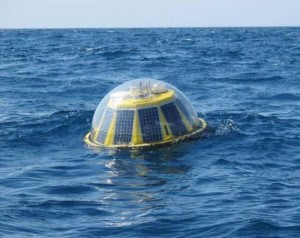Study May Lead To “Wave Farm” In Bermuda
 Wave energy developer Carnegie Wave Energy Limited has completed a year-long Bermuda wave study that demonstrates the viability of the Island’s wave regime for a commercial CETO wave energy project.
Wave energy developer Carnegie Wave Energy Limited has completed a year-long Bermuda wave study that demonstrates the viability of the Island’s wave regime for a commercial CETO wave energy project.
Carnegie report that over the past 12 months, in collaboration with Bermudian company Triton Renewable Energy Ltd, they undertook the first detailed study of Bermuda’s wave regime to explore the potential for a commercial CETO wave energy project.
The study was performed with the technical support of the Ground Electronics Services and Bermuda Weather Service [BAS-Serco Ltd.].
The company quotes Minister of Environment, Planning and Infrastructure Strategy Marc Bean as saying, “The success of this technology will serve to move Bermuda ever closer to our Energy White Paper targets of reducing our reliance on fossil fuels and increasing our reliance on renewable sources of energy. I look forward to the deployment of this promising, clean and efficient energy technology.”
Tim Hasselbring, Triton’s Managing Director, said, “Bermuda is a densely populated isolated oceanic island with limited natural resources that can be called upon. This project promises significant benefits to the community in the form of job creation, significantly increased energy and freshwater security and reduced dependence on imported oil.”
Carnegie’s site development manager Mr. Tim Sawyer said, “We look forward to working with the Bermudan government to further develop a commercial CETO wave energy facility in Bermuda. This would follow on from Carnegie’s Perth Wave Energy Project which recently received US$16m in Australian Federal Government and Western Australia State Government grant funding.”
Carnegie and Triton propose to develop a commercial scale wave farm providing up to 20MW of electricity generation and desalinated water to Bermuda. In 2009, the project was selected as one of the Bermuda Electric Light Company Ltd’s preferred renewable energy projects.
Remote islands offer a natural market place for Carnegie’s CETO wave power system. CETO is the only wave technology that is both fully submerged and generates power and water onshore. Bermuda, like most remote islands, is largely reliant upon imported diesel for power generation which is both expensive and comes at an environmental cost. The current retail power tariff on Bermuda is 42c/kWh.
Photo: Carnegie wave measuring buoy off Bermuda, courtesy Triton
Read More About
Category: All, Environment


Greetings and ‘Happy Mothers Day’ Bermuda!!!
This project sounds great and exactly what Bermuda needs at this time!!!
I Pray that if the ‘Wind Farm’ gets approval and funding, the cost to Bermudian subscribers of the energy, will be affordable to low-income families / individuals.
Agree, this would be a huge step for Bermuda.. Lets Get it!!!
Strange how a wave power project test module needs solar panels to keep it operating…
Just sayin….
This floating device is just measuring waves (amplitude, period and frequency), providing the data needed to assess the energy available throughout the year.
Stop and think for a minute…it will come to you.
Still strange… sorry!!
it is a sensor device for measuring waves, not a machine that converts wave motion to electrical energy. With luck those come later.